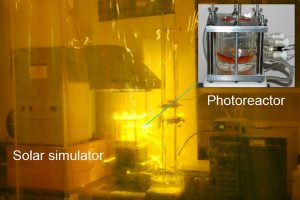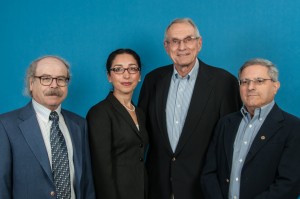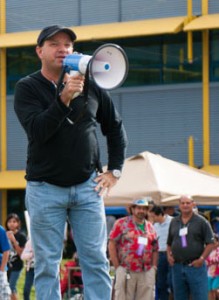Student-Built Solar Cars, Cookers and Hydrogen Inventions
Energize the EnergyWhiz Olympics
More than 650 elementary, middle and high school students—from across Florida—will show off their Science, Technology, Engineering, Art and Math (STEAM) skills at the 11th annual EnergyWhiz Olympics on Saturday, May 4th in Cocoa.
The EnergyWhiz Olympics is a daylong event showcasing student-built projects in solar and hydrogen. These hands-on renewable energy competitions expose students to alternative energy fuel sources and encourage scientific know-how, creative thinking, experimentation and teamwork.
The public is invited to attend free of charge. The event is located on Brevard Community College’s Cocoa Campus, at the University of Central Florida’s Florida Solar Energy Center, 1679 Clearlake Road. Competitions are from 10:00 a.m. until 2:00 p.m., with an awards ceremony following.
Activities include:
- The Energy Innovations program (10:00 a.m.) is a full-scale solar electric design and marketing challenge for middle and high school students. Each participating team designs and constructs a product or artistic work fully powered by photovoltaics (PV), also called solar electric cells. In addition, teams create marketing pieces—such as brochures, fliers, and posters—to accompany their products.
- The Hydrogen Challenge (10:30 a.m.) for students in grades 6 through 12, provide opportunities for student teams to explore hydrogen through hands-on engineering. Students demonstrate an understanding of hydrogen through a creative timing apparatus built with several Rube Goldberg-type steps.
- The Battery Assisted Transport (BAT) Mobile (11:00 a.m.) challenges students in grades 6 through 8, to build and race model-sized electric cars. The race tests the creative engineering skills of students as they gain hands-on experience in the automotive design process. This event is a component of the Department of Energy’s Middle School Science Bowl.
- The Junior Solar Sprint (11:30 a.m.) is a competition that challenges middle-school students to design, build and race model solar cars. Awards are given based on vehicle design, quality of craftsmanship, innovation and vehicle speed.
- The Bright House Solar Energy Cookoff (1:00 p.m.) challenges students in grades 4 through 12 to design and build solar cookers and cook a recipe of their own creation using the power of the sun. In Top Chef-style, each dish will be judged by a panel of experts based on taste, ingredients and creativity.
- The Electrathon (10:00 a.m. and 1:00 p.m.) is a competition for high school students and older. The go-cart-type vehicles, powered by an electric motor and batteries, must be skillfully designed, built and driven to maximize distance traveled within a given time limit.
- In addition, Food Truck Bazaar will be on site with 10 different food trucks (11 a.m. to 3:00 p.m.).
For more information, visit
http://www.fsec.ucf.edu/en/education/k-12/energywhiz_olympics/index.htm, or watch a video about the EnergyWhiz Olympics at http://vimeo.com/9522310.
CONTACT:
Susan Schleith, FSEC Education Coordinator, 321-638-1017 or susan@fsec.ucf.edu
Sherri Shields, Asst. Director Communications, 321-638-1019 or sherri@fsec.ucf.edu
Note: photographs from previous years events available upon request.
About FSEC: The Florida Solar Energy Center, a research institute of the University of Central Florida, is the largest and most active state-supported energy research institute in the nation. Current divisions and their research activities include Advanced Energy Research: alternative transportation systems, hydrogen fuel and fuel cells; Buildings Research: energy-efficient buildings; and Solar Energy: solar water and pool heating, and solar electric and distributed generation systems. For more information about the center, visit http://www.floridaenergycenter.org or call the FSEC Public Affairs Office at 321-638-1015.
UCF Stands For Opportunity: The University of Central Florida is a metropolitan research university that ranks as the 2nd largest in the nation with more than 58,000 students. UCF’s first classes were offered in 1968. The university offers impressive academic and research environments that power the region’s economic development. UCF’s culture of opportunity is driven by our diversity, Orlando environment, history of entrepreneurship and our youth, relevance and energy. For more information, visit http://news.ucf.edu.


